Looking for a Personalized Diet Plan?
Makhana Calories, Nutrition, and Health Benefits

Makhana, also known as phool makhana, fox nuts, or lotus seeds, has gained popularity for its incredible health benefits and versatility as a snack.
Not only is it packed with essential nutrients, but it is also a low-calorie option that fits well into a balanced diet.
Whether you are looking to lose weight, manage diabetes, or simply maintain a healthy lifestyle, makhana is a great addition to your diet.
Let’s explore the benefits, nutritional value, and various ways you can incorporate makhana into your daily meals, while also learning how the Hint app can help you track your intake for optimal health.
TL;DR
- Makhana is a good source of essential vitamins and minerals like vitamin A, niacin, vitamin B5, calcium, and iron.
- It is also rich in potassium, protein, thiamin, and magnesium, making it a nutrient-dense, gluten-free, high-fiber snack.
- Incorporating makhana into your diet promotes weight loss, heart health, and improved digestion, and helps control blood sugar levels.
Makhana Calories
Makhana is relatively low in calories, making it an ideal snack for those looking to manage their weight or simply eat more healthily.
One small cup (100 grams) of makhana contains 337 kcal. The calorie count increases with the serving size, so keeping portions in mind is essential.
| Quantity (in grams) | Makhana Calories (kcal) |
|---|---|
| Small cup (100 grams) | 337 |
| Medium cup (200 grams) | 674 |
| Large cup (300 grams) | 1011 |
Tracking your calorie intake from Makhana is simple with the Hint app. By logging your daily consumption, you can see how makhana fits into your overall nutrition plan, whether for weight loss or maintenance.
Watch: How to Track Makhana Calories on the Hint App
Makhana Nutrition
Makhana is a good source of vitamin A, niacin, vitamin B5, calcium, and iron, and an excellent source of potassium, protein, thiamin, vitamin B6, folate, phosphorus, magnesium, copper, and manganese. It contains 76.4 % carbohydrates, 18.3 % protein, and 5.3% fat.
| Nutrient | Amount per 100 grams |
|---|---|
| Energy ( kcal) | 337 |
| Protein (g) | 15.4 |
| Carbohydrates (g) | 64.5 |
| Fat (g) | 2.0 |
| Sugar (g) | 14.9 |
| Dietary fiber (g) | 2.2 |
| Sodium (mg) | 5.0 |
| Calcium(mg) | 163 |
| Iron(mg) | 3.5 |
| Phosphorus(mg) | 626 |
| Magnesium(mg) | 210 |
| Copper(mg) | 0.35 |
| Manganese(mcg) | 2.32 |
| Thiamin(mg) | 0.64 |
| Vitamin B6 (mg) | 0.63 |
| Vitamin B9 (mcg) | 104 |
The Hint app allows you to monitor not only calories but also detailed nutrient intake, helping you stay informed about your vitamin and mineral consumption.
Hint Pro users can take advantage of personalized insights into their nutrient needs based on their health goals.
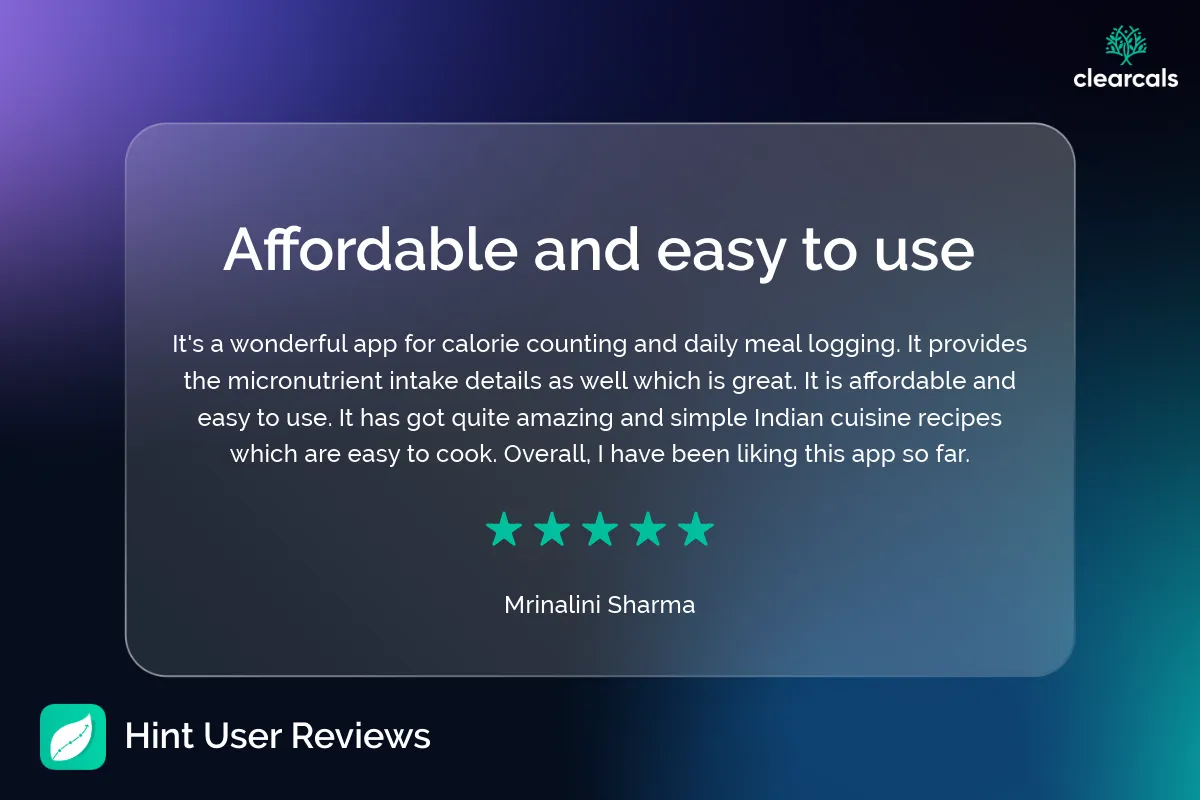
Makhana Protein
Makhana is a moderate source of protein, offering about 15.4 grams of protein per 100 grams. This makes it a valuable addition to vegetarian and vegan diets that may otherwise lack protein-rich foods.
The Hint Pro subscription allows you to track your protein intake daily and adjust your goals based on your needs.
Makhana Benefits
Makhana is not just a tasty snack but also brings numerous health benefits. Let’s explore some key advantages:
Promotes Weight Loss
Makhana is a low-calorie, high-fiber food that helps you feel full and satisfied, reducing overeating and aiding weight loss.
Improves Digestion
Being high in fiber, makhana supports digestive health by promoting healthy bowel movements and preventing constipation.
Improves Heart Health
Makhana’s magnesium and potassium content support heart health by helping to lower blood pressure and regulate heartbeat.
Controls Blood Sugar Levels
With a low glycemic index, makhana does not cause rapid spikes in blood sugar levels, making it a good choice for people with diabetes or prediabetes.
Strengthens Bones
Makhana is rich in calcium, making it an excellent food for building and maintaining strong bones and teeth.
Reduces Inflammation
The anti-inflammatory properties of makhana can help reduce inflammation linked to chronic diseases such as heart disease, cancer, and arthritis.
Gluten-Free and Non-Allergenic
Makhana is naturally gluten-free and non-allergenic, making it a safe snack for those with gluten intolerance or various food allergies.
Rich in Antioxidants
Makhana contains antioxidants that protect the body from free radical damage, reducing the risk of chronic diseases such as heart disease and cancer.
Incorporating makhana into your diet not only helps improve your overall health but also provides a delicious and versatile option for meals and snacks.
Makhana for Weight Loss
Makhana’s combination of low calories and high fiber makes it an excellent snack for those trying to lose weight. Fiber helps you feel full for longer, preventing overeating and promoting weight loss.
By using the Hint app, you can easily track your calorie intake and ensure that makhana fits into your personalized diet plan.
If you’re looking for expert guidance on how to incorporate makhana and other healthy foods into your weight loss plan, the Hint Premium subscription offers unlimited consultations with qualified dietitians. These dietitians can provide tailored advice and meal plans to help you reach your goals.

Is Makhana Good for Health?
Yes! Makhana is an incredibly healthy snack, offering a range of nutrients like protein, calcium, and antioxidants. Its combination of vitamins and minerals makes it ideal for promoting heart health, improving digestion, and strengthening bones.
Is Makhana Good for Weight Loss?
Absolutely! With its low-calorie and high fiber content, makhana is perfect for those looking to shed a few kilos.
The Hint Premium subscription offers the added benefit of working with experienced dietitians who can create personalized weight loss plans that include nutritious snacks like makhana.
Is Makhana Good for Diabetes?
Yes, makhana is a great option for individuals with diabetes due to its low glycemic index, which helps maintain steady blood sugar levels.
The Hint app allows you to track your carbohydrate intake and manage your diabetes effectively.
Is Makhana Good for Weight Gain?
If you're looking to gain weight, makhana can also be included in higher-calorie recipes, such as adding it to nuts or yogurt.
The Hint Premium subscription can provide you with tailored meal plans to help you achieve healthy weight gain.
Top 8 Recipes of Makhana
While incorporating makhana into your diet may have some potential benefits, you should be aware of how it is prepared and the resulting nutrition profile of the recipe.
1. Roasted Makhana Calories
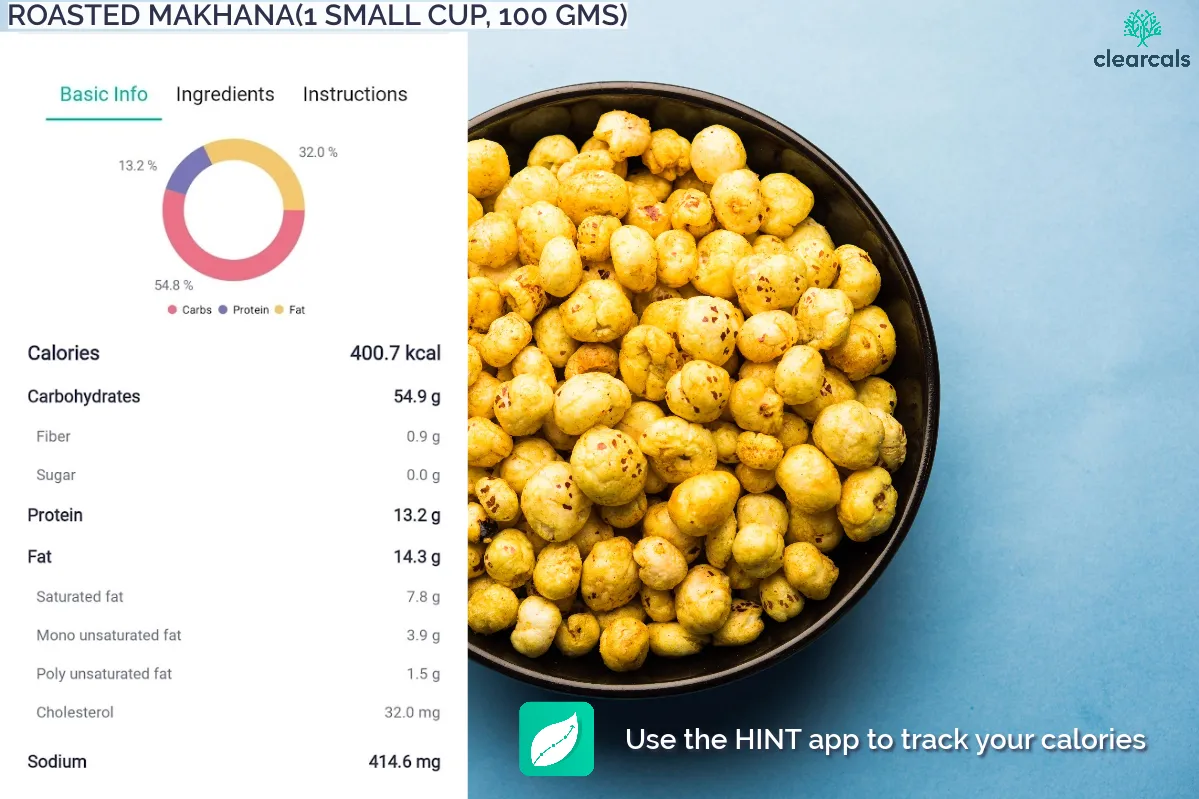
1 small cup (100 grams) of roasted makhana provides 401 kcal. Out of these calories, 54.8 % is from carbohydrates, 13.2 % is from protein, and 32.0 % is from fat.
Roasted makhana is a good source of vitamin A, niacin, vitamin B5, calcium, and iron, and an excellent source of potassium, protein, thiamin, vitamin B6, folate, phosphorus, magnesium, copper, and manganese. It helps strengthen muscles and boost immunity.
2. Phool Makhana Curry Calories
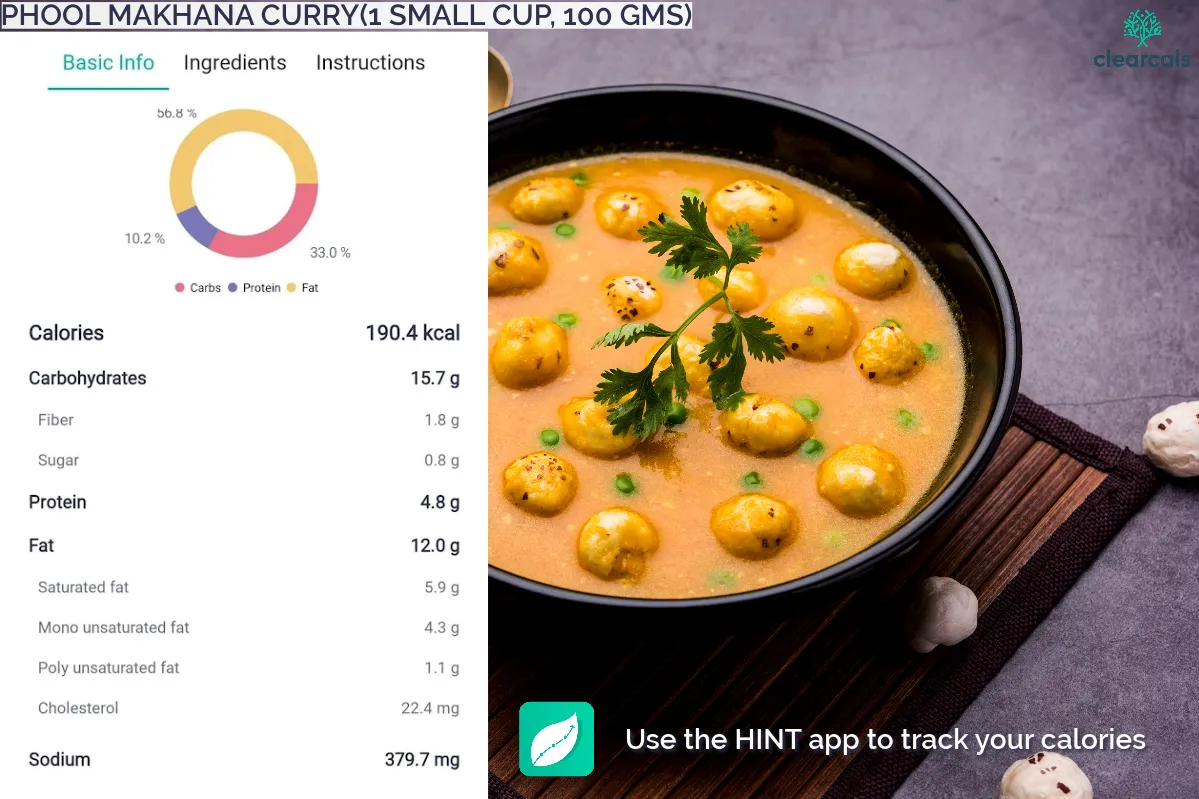
1 small cup ( 100 grams ) of phool makhana curry has 190 kcal. Out of these calories, 33% is from carbohydrates, 10.2 % is from protein, and 56.8 % is from fat.
Phool makhana curry is a good source of protein, fiber, phosphorus, magnesium, copper, vitamin B6, and an excellent source of vitamin K. It helps in preventing constipation and aids in weight loss.
3. Aloo Makhana Curry Calories
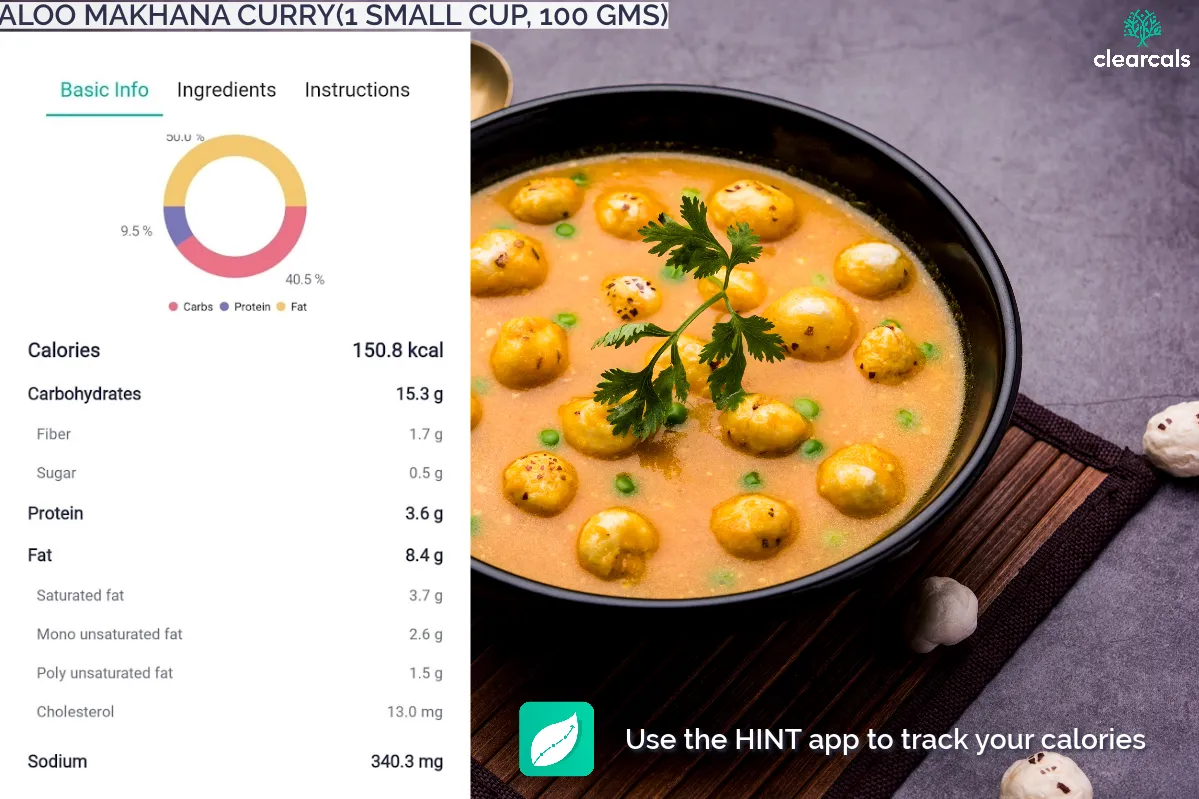
1 small cup ( 100 grams ) of aloo makhana curry has 151 kcal. Out of these calories, 40.5 % is from carbohydrates, 9.5 % is from protein, and 50 % is from fat.
Aloo makhana curry is a protein, fiber, phosphorus, magnesium, manganese, vitamin B6, and an excellent source of vitamin K. Makhana acts as an anti-oxidant, is very light, and easy to digest.
4. Palak Makhana Curry Calories
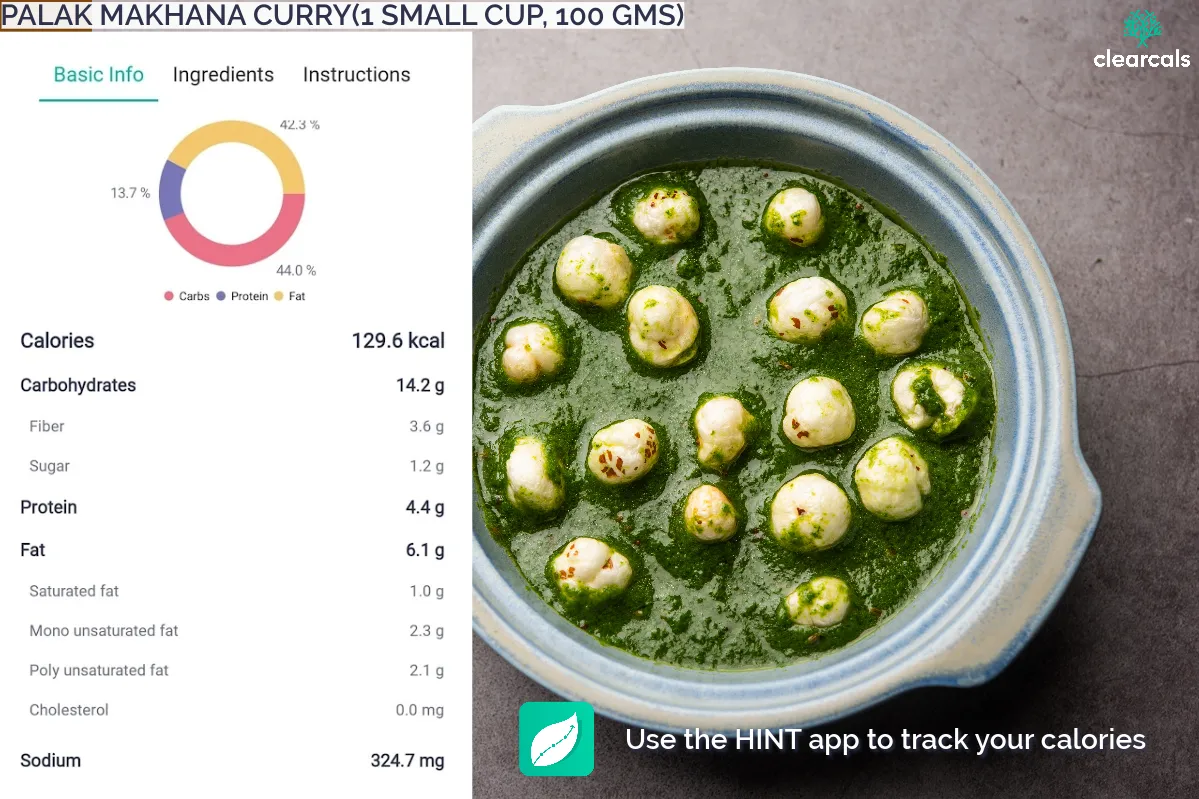
1 small cup ( 100 grams ) of palak makhana curry has 130 kcal. Out of these calories, 44 % is from carbohydrates, 13.7 % is from protein, and 42.3 % is from fat.
Palak makhana curry is a good source of protein, fiber, calcium, phosphorus, magnesium, iron, copper, vitamin B1, B5, and vitamin E, and an excellent source of manganese and vitamin K. It helps in strengthening bones and maintains bone health.
5. Matar Makhana Sabzi Calories
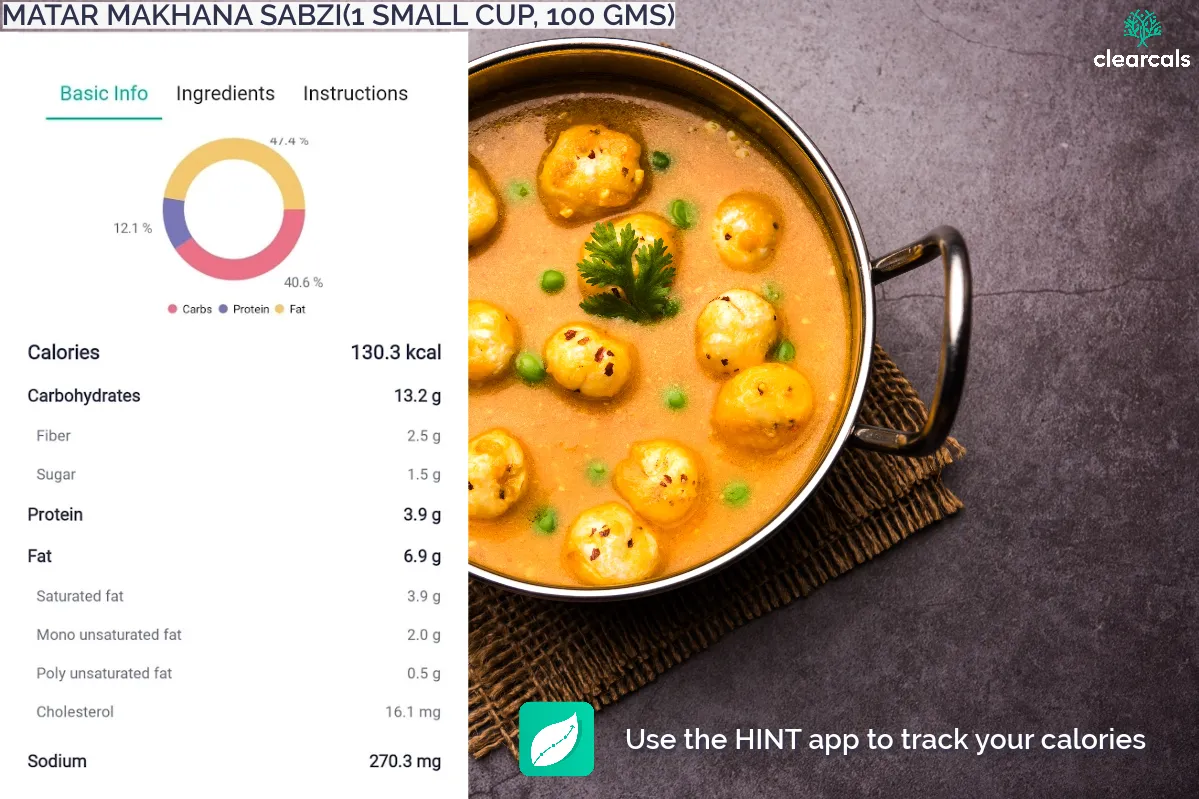
1 small cup ( 100 grams ) of matar makhana sabzi has 130 kcal. Out of these calories, 40.6 % is from carbohydrates, 12.1 % is from protein, and 47.4 % is from fat.
Matar makhana sabzi is a good source of protein, fiber, calcium, phosphorus, magnesium, copper, selenium, vitamin B1, manganese, vitamin B7, and vitamin K. It helps in boosting immunity and provides satiety.
6. Paneer Makhana Sabzi Calories
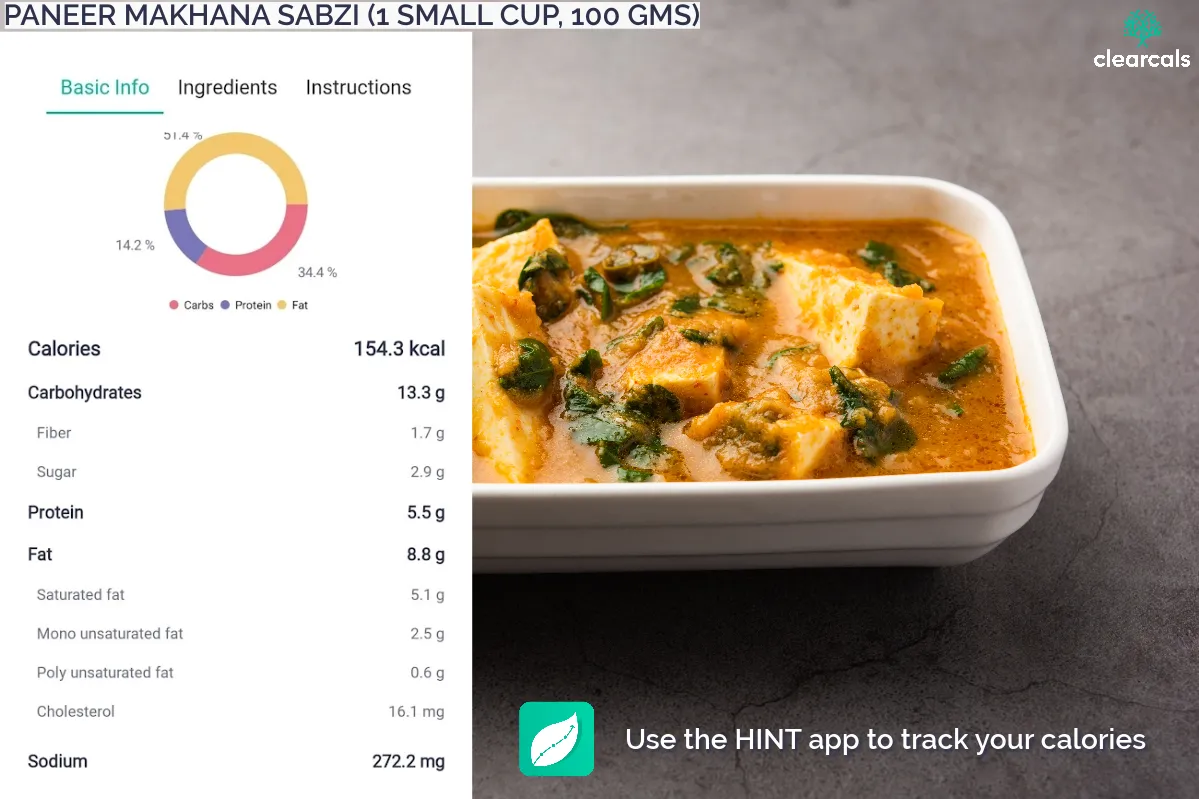
1 small cup ( 100 grams ) of paneer makhana sabzi has 154 kcal. Out of these calories, 34.4 % is from carbohydrates, 14.2 % is from protein, and 51.4 % is from fat.
Paneer makhana sabzi is a good source of protein, calcium, phosphorus, magnesium, selenium, manganese, vitamin B7, and an excellent source of vitamin K. It helps in building muscle and maintaining bone health.
7. Capsicum Makhana Curry Calories
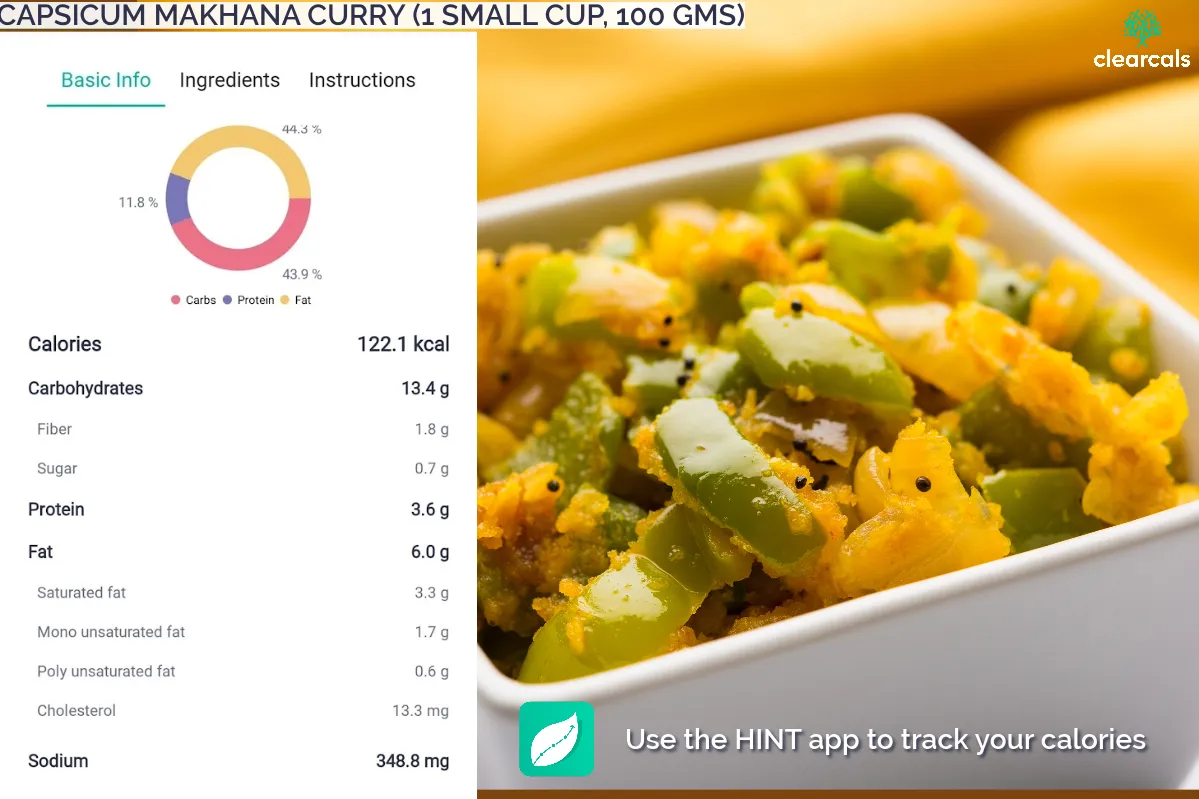
1 small cup ( 100 grams ) of capsicum makhana curry has 122 kcal. Out of these calories, 43.9 % is from carbohydrates, 11.8 % is from protein, and 44.3 % is from fat.
Capsicum makhana curry is a good source of protein, fiber, phosphorus, magnesium, manganese, vitamin B1, and vitamin B6, and an excellent source of vitamin K. It helps in strengthening bones and building immunity.
8. Makhana Kheer Calories
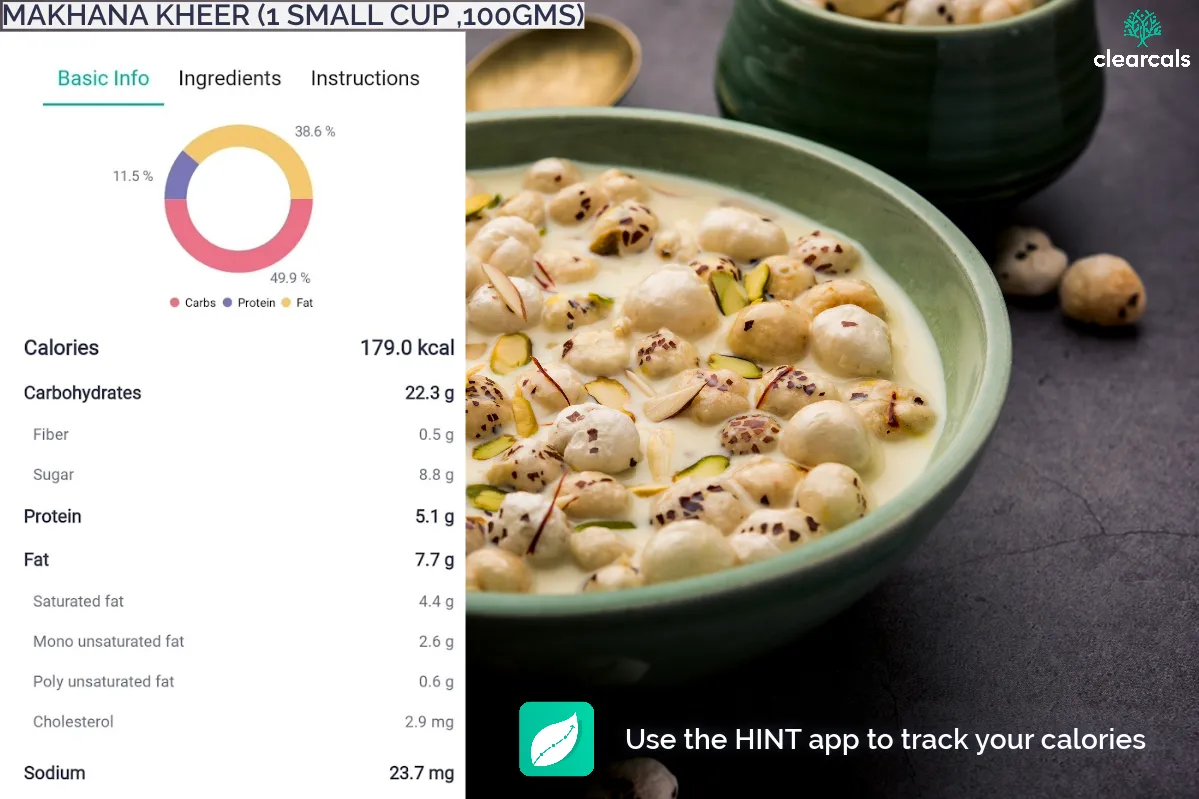
1 small cup ( 100 grams ) of makhana kheer has 179 kcal. Out of these calories, 49.9 % is from carbohydrates, 11.5 % is from protein, and 38.6 % is from fat.
Makhana kheer is a good source of protein, calcium, phosphorus, thiamine, pantothenic acid, vitamin B7, and vitamin E. It helps in building muscle and building immunity.
Frequently Asked Questions
1. What is Makhana?
Makhana, also known as fox nuts or lotus seeds, is the popped seed of the lotus flower.
2. Is Makhana gluten-free?
Yes, Makhana is naturally gluten-free, making it suitable for those with gluten sensitivities.
3. Can Makhana be consumed during pregnancy?
Yes, in moderation. Makhana provides essential nutrients and can be a healthy snack option for pregnant women.
4. Is Makhana safe for individuals with nut allergies?
Yes, Makhana is not a nut; it's a seed. It is generally safe for those with nut allergies.
5. Does Makhana aid in weight management?
Yes, Makhana is a low-calorie and high-fiber snack, making it suitable for weight-conscious individuals.
6. Is Makhana suitable for those with diabetes?
Makhana has a low glycemic index and may be a good option for those managing diabetes. However, moderation is key.
7. Can children eat Makhana?
Yes, Makhana is a nutritious and easily digestible snack suitable for children. Ensure age-appropriate portion sizes.
8. Is Makhana good for heart health?
Yes, the potassium content in Makhana supports heart health by helping regulate blood pressure.
9. Can Makhana be given to elderly individuals?
Yes, Makhana is a nutritious and easily digestible snack suitable for the elderly. Adjust portion sizes as needed.
10. Are there any side effects of consuming Makhana?
When consumed in moderation, Makhana is generally safe. Excessive consumption may lead to unwanted calorie intake.
Final Thoughts
Makhana is a versatile and nutrient-dense food that can be a part of any healthy diet. Whether you're looking to lose weight, manage diabetes, or enjoy a delicious snack, makhana offers a range of benefits.
The Hint app makes it easy to track your intake and stay on top of your nutrition goals. At the same time, the Hint Premium subscription gives you access to unlimited consultations with experienced dietitians, ensuring that your diet is perfectly tailored to your needs.
Download the Hint app today and start your journey to better health with makhana and expert guidance from qualified dietitians!
REFERENCES:
Exclusive Offer: Enjoy One Month of Free Hint Premium Access
When you purchase any of the following from the Clearcals Store: Garmin Venu Sq 2, Garmin Vivoactive 5, Garmin Instinct 2, Instinct 2X Solar, or Instinct 2X Solar Tactical, you'll receive one month of free Hint Premium (worth Rs. 1999), which includes:
✅ Unlimited dietitian consultations
✅ Personalized diet and workout plans
✅ Advanced calorie and nutrition tracking
🚀 Visit the Clearcals Store today and unlock your free Hint Premium access!





